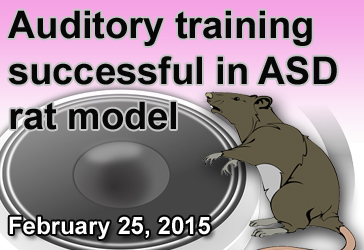Check out other stories from the Latest News
Behavioral Training May Normalize Brain Dysfunction
By Chelsea E. Toledo, M.A. on February 25, 2015

Background: Research suggests that both genetic and environmental factors play a role in the development of autism spectrum disorder (ASD), which is characterized by differences in brain function and behavior. Multiple studies have pointed to antidepressants as a possible environmental factor, proposing that exposure to the drugs in the weeks before and after birth could induce ASD symptoms in children. In some animal models of autism, researchers expose rats to antidepressants to mimic the behavioral effects seen in children.
What’s new: On February 2, 2015, the journal Proceedings of the National Academy of Sciences published a study examining the effects of behavioral training on rats exposed to antidepressants shortly after birth. The researchers found that the rats behaved similarly to children with ASD—preferring to play alone than with other rats, for example. Using a set of sounds shown to drive changes in the brain in typically developing animals, the researchers observed that, at first, rats exposed to antidepressants scored poorly on cognitive tests—and had underlying brain dysfunction. Over the course of two months—the rough equivalent of two years for people—the rats continued the auditory training and showed significant improvement in their behavioral responses and some reversal of their brain dysfunction, as well.
Why it’s important: The effect of antidepressant exposure affected male rats much more than females—a pattern that mirrors the prevalence of ASD in the human population, in which boys are four times more likely than girls to receive a diagnosis. The study also positions behavioral training that targets brain function as a possible therapy for children with ASD.
Help me understand :
| Source(s) : |
| Tweet |

